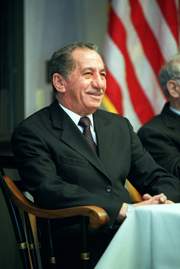 Boston,
Jun 2 (CNA) -- Cyprus President Tassos Papadopoulos has described a UN proposal
for a comprehensive settlement ''a good basis for an eventual solution'' and
said he would work for a bizonal, bicommunal federation, pointing out that a
workable, equitable and acceptable plan must be agreed upon by all.
Boston,
Jun 2 (CNA) -- Cyprus President Tassos Papadopoulos has described a UN proposal
for a comprehensive settlement ''a good basis for an eventual solution'' and
said he would work for a bizonal, bicommunal federation, pointing out that a
workable, equitable and acceptable plan must be agreed upon by all.Addressing a distinguished audience at the Kennedy School of Government, at Harvard University, he expressed disappointment that the UN proposal (Annan plan), which he said was geared to satisfy Turkey's demands, did not allow the people of Cyprus to accept it.
President Papadopoulos said that a Cyprus settlement would benefit not only the Cypriots but would also serve as a model of hope to other similar situations and promote stability and security in the wider region of the Mediterranean.
Referring to US-Cyprus relations, he said Cypriots were determined to achieve new levels of cooperation and as members of the European Union contribute to the consolidation of the transatlantic relationship between the EU and the US.
''Our position should not be mistaken or misunderstood: We do not reject the Annan plan. We still believe it is a good basis for an eventual solution. We still accept a bizonal, bicommunal function federation, but this version of the Plan was not. But it is too important to expect us to rush into such a fundamental and irreversible change with what can only be described as an unseemly haste which would not be acceptable to any other state,'' Papadopoulos said.
He noted that the plan since it was put forward had changed significantly and said that the way ahead was ''to continue to work hard until we reach a plan that is both workable, equitable and acceptable to all of us.''
President Papadopoulos said that concerns of the Greek Cypriots which he raised during negotiations ''went unheeded'' and it seemed that everybody was so keen to get Turkey and the Turkish Cypriots on board that mere acceptance by the Turkish side to engage in talks was considered to be such a great improvement on past attitudes that it had to be ''rewarded by satisfying all demands made by the Turkish side.''
He explained that the concerns he had raised related to the dissolution of the Republic of Cyprus upon an agreed settlement, the delay in benefits to Greek Cypriots when at the same time Turkish Cypriots were to receive all benefits up-front, lengthy delays in paying limited and uncertain amount of compensation for property, the denial of many refugees to return to their homes in the Turkish Cypriot administered area and the right all Turkish settlers would have claimed to remain on the island.
''Some of my most profound worries about the plan did not concern those areas where we felt that the compromises offered or imposed were simply not fair to us. They were promoted by my concern for that kind of Cyprus that would have resulted from this plan and its ability to play its proper role in the EU,'' he explained.
He said that it should therefore come as no surprise to any objective observer that a resounding 76 per cent of Greek Cypriots rejected the plan, a percentage that includes some 70 per cent of the refugees.
''They cannot all be naive. They cannot all be misguided or deceived. The people of Cyprus are a highly literate society, very politicized and have a proud tradition of democratic process and freedom of expression,'' he said.
President Papadopoulos said it was not possible to know whether the plan would have worked, had it been accepted in April's referenda among the island's two communities.
''We cannot know and thus we do not know. It may have worked but what if it did not?'' he warned.
Papadopoulos stressed that the decision of the people must be respected by all and said that he was obligated and bound by political morality and constitutional provisions to respect it.
''Nobody has the right to criticize the people or be vindictive or punish a whole people in the exercise of its supreme right in a democratic way rejected a plan designed by others and determining its future and that of generations to come,'' he added.
He said that through negotiations, he intended to pursue the reunification of the country, its economy and society, he wanted a functional solution in a functional state structure, in which no one community would impose its will on the other, he sought to secure respect for human rights, an end of the occupation and gradual withdrawal of all foreign troops with the aim of full demilitarisation and safeguards that the solution to be found would actually be implemented.
On bilateral cooperation, President Papadopoulos said the two countries shared the same fundamental values and principles and referred to the common aim to fight effectively international terrorism, noting that Cyprus joined immediately and actively the US in the international coalition to fight terrorism and granted overflight rights to the US and facilities for humanitarian purposes and emergency situations.
''The people and government of the Republic of Cyprus, are determined to strive in order to achieve new levels of co-operation between our two countries. At the same time, as a member of the European Union we will add our modest contribution to the efforts for consolidating the transatlantic relationship between the United States and the European Union,'' the Cypriot President conluded.